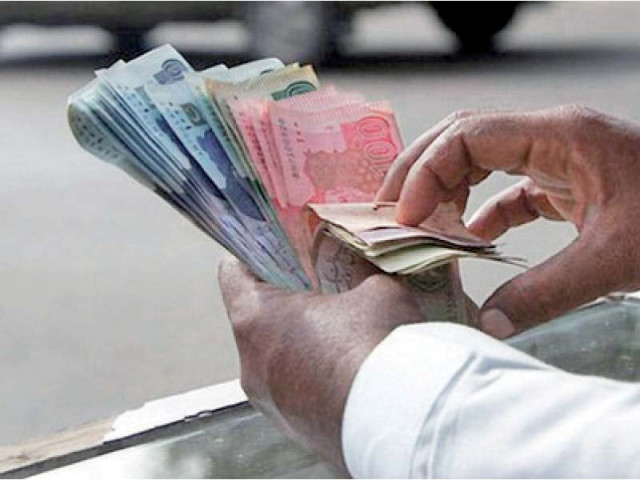PTI govt seeks nod for Rs14.5tr loans
Amount for FY21 is two-thirds less than original demand for outgoing fiscal year

The finance ministry placed total demand for Rs14.8 trillion before the National Assembly under the head of charged expendi-tures. PHOTO: REUTERS
The government’s decision, taken last year, to re-profile its debt obtained from the State Bank of Pakistan (SBP) and zero borrowing from the central bank helped it to limit the three-month borrowing cycle. For the outgoing fiscal year, the original demand approved by the National Assembly was Rs43.5 trillion.
The Rs14.5-trillion demand is more than the total size of federal budget for 2020-21, which is worth Rs7.1 trillion. The difference is because the government does not book loans taken for repayment of domestic and foreign debt in the budget. These transactions are settled outside the budget.
The finance ministry placed total demand for Rs14.8 trillion before the National Assembly under the head of charged expenditures. The authorisation of another roughly Rs300 billion has been sought to meet obligatory expenditures of the National Assembly, Senate, Election Commission of Pakistan, Supreme Court of Pakistan, president of Pakistan, Islamabad High Court, Pakistan Railways and Foreign Office.
The Rs14.8-trillion borrowing is the charged expenditure under the constitution and the National Assembly does not have the right to veto this expenditure and its role in this case is limited to only authorisation.
The government placed the demand on the day it faced criticism from the National Assembly for reducing the charged expenditure of the house, which National Assembly Speaker Asad Qaiser termed unconstitutional. Federal Minister for Industries Hammad Azhar tried to explain the government’s position on reducing the National Assembly’s expenditure but the speaker gave the ruling that the government did not have the authority.
However, the proposed expenditure for the National Assembly in the next fiscal year is higher than the original budget. But it is still less than the demand placed by the assembly. For the outgoing fiscal year, the National Assembly had approved Rs33.5 trillion for obligatory expenditure of the government and the new demand is Rs28.6 trillion or 66% less than the outgoing fiscal year.
This includes Rs14.5 trillion worth of debt servicing-related spending bill, which is lower by Rs29 trillion or 67% than the expenses approved by the National Assembly in June last year.
However, as against the original estimate of Rs43.5 trillion, the Ministry of Finance expects the revised spending on debt servicing at Rs19.5 trillion due to the re-profiling of central bank debt.
This means the proposed borrowing bill of Rs14.5 trillion is less by Rs5 trillion or one-fourth compared to the outgoing fiscal year.
The finance ministry expects that its reliance on short-term loans will fall further in the next fiscal year as it plans to issue long-term floating and fixed rate Pakistan Investment Bonds (PIBs).
The central bank on Thursday also cut interest rate by another one percentage point to 7%, which will help to curtail the debt servicing cost.
Except for Rs2.9 trillion that will be part of the federal budget, the rest of the amount will not be booked in the budget and will be directly borrowed from domestic and foreign markets to repay loans obtained in the past.
Interest payments on domestic and foreign loans will consume roughly 42% of the proposed Rs7.1-trillion budget for the next fiscal year.
As against the Rs39.5-trillion original borrowing plan for the outgoing fiscal year, the government sought National Assembly’s approval for Rs10.1 trillion for the repayment of domestic debt in the next fiscal year. The amount is 75% or Rs29.3 trillion less than the outgoing fiscal year.
The government has also placed another demand for Rs2.63 trillion for domestic debt servicing, which is 4% or Rs101 billion higher than the outgoing fiscal year.
To repay foreign loans, the government has sought Rs1.228 trillion for the new fiscal year, which will be obtained from foreign lenders. The requirement for foreign loan repayment is up by 12% or Rs129 billion. The government has sought another Rs315 billion to pay interest on foreign loans, which is lower by Rs45 billion or 12.5% due to the rollover of G20 debt.
The government has placed a demand for Rs183.7 billion before the National Assembly to repay short-term foreign loans, which is up by 70% or Rs75 billion.
By the end of current fiscal year, the public debt-to-GDP ratio is estimated to jump to 92% as the government struggles to enhance its revenues. The government is legally bound to limit the debt to below 60% of gross domestic product (GDP) but every successive government has breached this statutory limit.
Other charged expenditures
For the staff, household and allowances of the president, the government has placed a demand for Rs992 million before the National Assembly, which is at the level of outgoing fiscal year.
But both the National Assembly and Senate will get an increase in their allocations over the original budget for this year. The government has placed a demand for Rs2.24 billion for the National Assembly, up by Rs240 million or 12%. The Senate will get over Rs2 billion, higher by Rs130 million or 6.8%.
The government has sought Rs2.4 billion for charged expenditures of the Supreme Court, which is higher by Rs300 million or 14%.
For charged expenditures of the Islamabad High Court, a demand for Rs700 million has been placed before the National Assembly, higher by Rs121 million or nearly 21%. The Election Commission of Pakistan will get Rs3.7 billion, a reduction of Rs900 million or 53% over this year.
Published in The Express Tribune, June 26th, 2020.
Like Business on Facebook, follow @TribuneBiz on Twitter to stay informed and join in the conversation.


















COMMENTS
Comments are moderated and generally will be posted if they are on-topic and not abusive.
For more information, please see our Comments FAQ